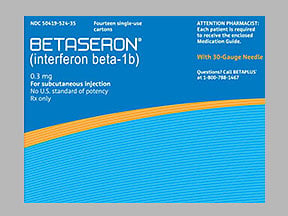
Betaseron Coupons & Savings Card – Discount Prices from $725.78
My prescription
Edit
0.3MG, Betaseron (1 Kit)
Select pharmacy

Walgreens
$725.78
COUPON PRICE
Albertsons
$740.44
COUPON PRICE
Walmart
$781.49
COUPON PRICEBetaseron savings card
Show this card to your pharmacist
Walgreens
$725.78
BIN
ID
PCN
GRP
019876
LH6C1D0954
CHIPPO
LHX
Powered by
Related interferon betas prescriptions
More prescriptions for multiple sclerosis
Related interferon betas prescriptions
More prescriptions for multiple sclerosis
Price history for Betaseron
1 Kit, 0.3MG
Average retail price for Betaseron
Average SaveHealth price for Betaseron
Our price history data is based on aggregated prescription data collected from participating pharmacies in America. Our prescription data updates daily to reflect the latest price changes. If you notice a missing data point, it means there wasn't sufficient data available to generate a monetary value for that date.
*Retail prices are based on pharmacy claims data, and may not be accurate when we don't have enough claims.
Betaseron dosage forms
Dosage Quantity Price from Per unit 0.3MG 1 Kit $725.78 $725.78 0.3MG 14 Kits $10171.10 $726.51
| Dosage | Quantity | Price from | Per unit |
|---|---|---|---|
| 0.3MG | 1 Kit | $725.78 | $725.78 |
| 0.3MG | 14 Kits | $10171.10 | $726.51 |
What is the drug Betaseron used for?
Betaseron is used for the treatment of relapsing forms of multiple sclerosis (MS). It helps to reduce the frequency of clinical exacerbations and slow the progression of physical disability associated with the disease.
Is Betaseron still prescribed?
Yes, Betaseron is still prescribed. It is used for the treatment of relapsing forms of multiple sclerosis to reduce the frequency of clinical exacerbations. However, the decision to prescribe Betaseron depends on the individual patient's condition and the healthcare provider's assessment.
Is Betaseron an immunosuppressant?
Betaseron is not classified as an immunosuppressant. It is an interferon beta-1b medication used primarily to treat multiple sclerosis by modulating the immune system to reduce inflammation and slow the progression of the disease.
How much does a Betaseron injection cost?
The cost of a Betaseron injection can vary based on factors such as location, insurance coverage, and the pharmacy used. Without insurance, the price can be quite high, often several thousand dollars for a month's supply. It is advisable for individuals to check with their specific pharmacy and insurance provider for the most accurate and up-to-date pricing information. Additionally, there may be patient assistance programs available to help reduce the cost.
Does BETASERON suppress the immune system?
Betaseron (interferon beta-1b) does not primarily function as an immunosuppressant. Instead, it modulates the immune system to reduce inflammation and slow the progression of multiple sclerosis. While it affects immune activity, it is not classified as a traditional immunosuppressive drug.
